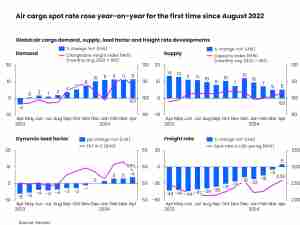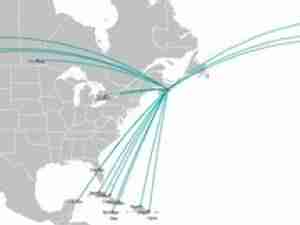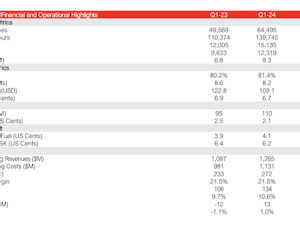Delta Air Lines Inc. expects earnings to exceed Wall Street’s projections for the second quarter as the carrier benefits from a step-up in corporate travel and steady leisure demand heading into summer.
Adjusted profit will be $2.20 to $2.50 a share in the current period, Delta said Wednesday in a statement that also revealed better-than-expected first-quarter results. The midpoint is above the $2.23 average of analysts’ estimates compiled by Bloomberg.
“Overall, the results and the guide looked very encouraging,” Stephen Trent, an analyst with Citi, said in a note. “Delta’s diverse revenue streams continue playing a positive role in the carrier’s earnings.”
Its shares rose 2.9% at 9:31 a.m. in New York, lifting rivals United Airlines Holdings Inc. and American Airlines Group Inc. as well. Delta’s stock gained 18% this year through Tuesday, leading a Standard & Poor’s index of the four largest US carriers.
The forecast shows how Delta, the first major US carrier to provide a preview for the current quarter, is capitalizing on rivals’ weakness as domestic-focused airlines slow growth and restructure networks. International demand remains strong, while corporate travel is accelerating among technology, consumer services and financial customers — which Delta previously identified as laggards in the post-pandemic recovery.
Delta has seen “another step forward” in business travel from the end of 2023, with close to a 15 percentage point revenue acceleration that has brought the carrier back fully to 2019 levels, Chief Executive Officer Ed Bastian said in an interview. Volume remains 85% to 90% of pre-pandemic levels.
Second-quarter revenue excluding Delta’s refinery will increase as much as 7% year over year, outpacing Wall Street’s expectations. Delta plans to expand flying capacity 6% to 7% this quarter, above the 5.9% growth expected by analysts.
Delta expects “no letup in demand,” Bastian said. The carrier hasn’t seen a dip that historically has occurred before the start of the summer season. “Both Memorial Day and early peeks at the Fourth of July look quite strong.”
High Costs
Still, Delta isn’t immune to the high costs plaguing the industry, including increased spending for labor and fuel, along with supply-chain snarls that have lengthened the time for aircraft and engine repairs. Delta previously said maintenance expense this year will increase $350 million over 2023. The carrier said Wednesday it expects second-quarter non-fuel costs for each seat flown a mile to rise 2%.
It has been working to offset a too-large workforce with programs to boost efficiency and productivity. Delta has about 10% more employees than in 2019 as a result of efforts to rebuild from the pandemic.
United, American and Delta are expected to account for 80% of second-quarter industry profit, according to Mike Linenberg, a Deutsche Bank analyst. Revenue for a group of 12 US carriers should increase 6% to $63 billion in the June quarter, while operating profit will drop 20% to $7.2 billion, he estimated in a report.
Delta’s adjusted first-quarter profit was 45 cents a share, topping the 36-cent average from analyst estimates. Revenue excluding refinery operations was $12.56 billion.
First-quarter revenue for the group of 12 carriers should be about $52.2 billion, up from a year ago, Linenberg estimated. The group is expected to report an operating loss of $381 million, compared with a $359 million operating profit in the same period last year.
Despite profit trending above expectations this quarter, Delta kept its full-year forecast unchanged, calling for adjusted earnings of $6 to $7 a share.










